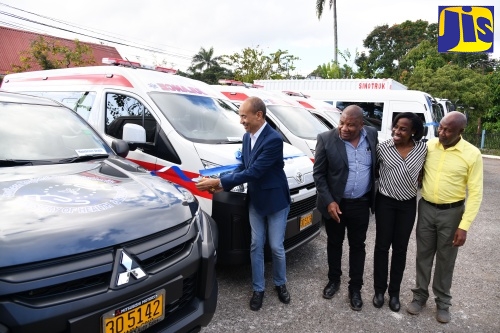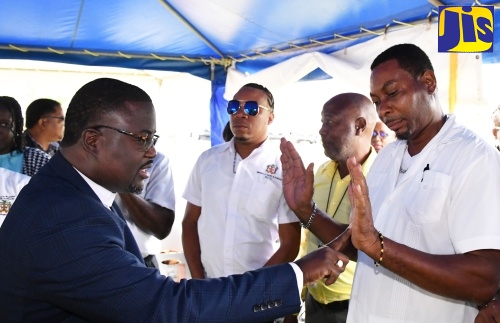New Buses Retrofitted into Ambulances in SRHA
By: , February 5, 2024The Full Story
In 2016, Robert Robinson, Transport Fleet Manager for the Southern Regional Health Authority (SRHA), got the brilliant idea to retrofit new buses into ambulances, as there was a shortage in the region, and today it is paying dividends.
“We were short on vehicles, the work load was too much for the number of units we had, so it was proposed that we buy one ambulance in 2016. I proposed that using the same amount of money or less, we purchase two buses and convert them to ambulances. In 2016, the cost of one ambulance was $19 million and the two new buses were bought and converted at a cost of $14 million,” Mr. Robinson tells JIS News in an interview.
For most of his life, Mr. Robinson worked around motor vehicles, so it was simply a matter of following the same principle used by companies that retrofit vehicles into ambulances.
“I thought it was a simple idea, so I proposed it and it was accepted,” he says.

Back then, there were only five ambulances for the entire region, which comprised three parishes, serving five hospitals and one community hospital.
“At the time, I was getting many calls from hospitals needing additional units because they had many patients who needed them. In an effort to make the system more efficient and to be able to accommodate more patients, the idea came,” he adds.
“In 2016, two of the smaller buses, popularly known as ‘Sponge Bob’, were retrofitted; in 2019, we did three 16-seater buses. For the 2022/2023 period, we retrofitted four buses and the three being handed over today (February 2), are for 2024,” Mr. Robinson notes.
In addition to millions of dollars in savings, this initiative translates to three ambulances for the price of two and turnaround time of two months from purchasing to retrofitting.

Ordering from the dealer and clearing a new ambulance takes an average of six to eight months waiting time.
For the three 2024 model ambulances, Mr. Robinson adds something new to the design as a result of some concerns he had.
“When we are carrying samples and blood products, the ambulances had to be fitted with an Igloo cooler, which each facility had to take to Kingston. This time, we inserted a fridge that is able to carry samples without compromising the product. We have also upgraded the inverter for electrical supplies to this model,” he notes.
The new ambulances also have a sink for handwashing and we now have two cylinders of oxygen for patients, fitted and able to work at all times. In addition to the stretcher, each new ambulance can also accommodate three sit-up staff – the nurse, the attendant and the driver.
Mr. Robinson is proud that since the start of the initiative in 2016, all the other Health Regions have come on board and are buying buses that have been retrofitted as ambulances.
In 2023, he also expanded his concept to include a new panel bus that he has retrofitted into a mobile maintenance unit.
“We bought a panel van and we designed and set it up with electrical supply that can power equipment such as drills, outlets, spaces for tools, racks for hanging implements, and on top of the unit for ladders, making it a mobile maintenance unit,” he says.
Meanwhile, Regional Director for the SRHA, Michael Bent, says the older ambulances will be put into the primary-care facilities – one in each of the three parishes served.
“When people come to the health centres, if after being assessed they need to be taken to the hospital, we can respond. This is part of our strategy. Our fleet does thousands of trips each year, so we are putting more reliable vehicles in the fleet. Our fleet now moves from 18 to 21 and each hospital will have at least two ambulances,” he notes.
On Friday (February 2), a total of nine new vehicles were handed over to the SRHA – three 2024 Toyota Hiace Buses converted to ambulances; four 2024 L200 Mitsubishi pickups; one 2024 Toyota Coaster bus, and one 2024 Sino truck.
They will be assigned to May Pen Hospital, Mandeville Regional Hospital and Black River Hospital; the Health Departments of Clarendon, Manchester and St. Elizabeth, and the Lionel Town Hospital.
The SRHA will have a bus for staff transportation, and a unit will be assigned to move the region’s medical waste.
The total cost of the nine vehicles and retrofitting is $98.7 million – Toyota Hiaces, $29.4 million; four L200 Mitsubishis, $24.8 million; Toyota Coaster, $15.4 million; Sino truck, $10.4 million, and retrofitting, $18.6 million.


